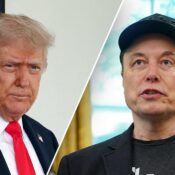
Nobel emphasizes denuclearization for Hiroshima survivor who was embraced by Obama
A Japanese man who survived the nuclear bombing of Hiroshima and was hugged by Barack Obama decades later during the former U.S. President’s visit to the city expressed his optimism that Friday’s Nobel Peace Prize would help to emphasize the importance of nuclear disarmament on a global scale.
The Nihon Hidankyo group of atomic bomb survivors was awarded the Nobel Prize by the Norwegian Nobel Committee in recognition of their efforts to raise awareness of the hazards of nuclear weapons and to document the suffering that was inflicted upon Hiroshima and Nagasaki, the only two cities to have ever been the victims of such attacks.
The award is presented one year prior to the 80th anniversary of the United States’ bombing of Japan in August 1945, which resulted in Japan’s surrender during World War Two.
Obama embraced Shigeaki Mori, who was eight years old when the weapon destroyed Hiroshima, during his 2016 visit to the atomic bomb memorial site. This moment became a defining image of the visit.
The venerable Mori responded with a simple affirmative when questioned by Reuters regarding whether he believed the Nobel Prize would increase awareness of the issue of denuclearization.
He stated that he was receiving an overwhelming number of interview requests and declined to provide any additional information.
In an interview with Reuters last year, Mori disclosed that the explosion had rendered him incapacitated. Upon his awakening, he observed a woman who was holding her own entrails and was requesting the location of the nearest hospital.
He embarked on a multi-decade mission to determine the number of victims cremated at his school playground as an adult. Additionally, the identities of twelve Americans who perished in the explosion were discovered through his research.
Obama, who praised Mori’s work in his speech and spoke of the “shared responsibility to look directly in the eye of history” during his visit to Hiroshima. Obama refrained from issuing any explicit apologies for the bombings, a stance that many Japanese believe is long outdated.
Although their numbers are diminishing and they are advanced in age, numerous nuclear weapon survivors, referred to as “hibakusha” in Japanese, have endeavored to preserve the legacies of Hiroshima and Nagasaki. They regard the events in the cities as more than merely historical moments, but as calls for change.
It seems that the call resonated. Joergen Watne Frydnes, the director of the Norwegian Nobel Committee, cautioned that nuclear nations should not consider employing nuclear weapons.
Mori expressed his desire for disarmament to Reuters last year, stating, “I simply do not want all of this to end up being a dream.”
All Categories
Recent Posts
Tags
+13162306000
zoneyetu@yahoo.com



